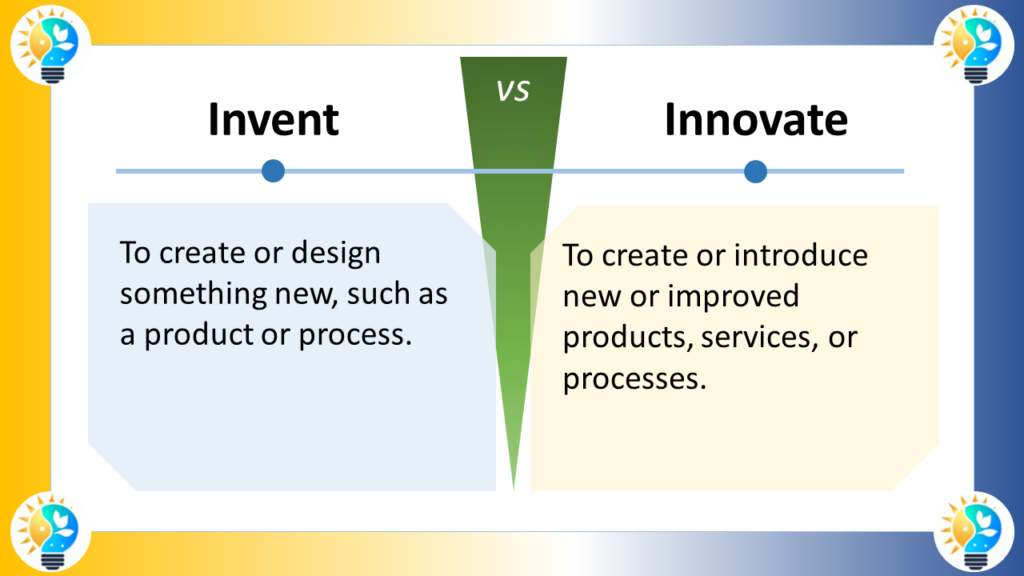Innovate and invent are terms often used interchangeably, but they focus on different aspects of the creation process.
Innovation involves improving or making significant changes to existing concepts, while invention creates something entirely new that has never been seen before.

Definition
Innovate
Innovation refers to the act of making changes to existing processes, products, or ideas, enhancing them or adapting them in novel ways.
Characteristics of Innovation:
- Improvement: Focuses on enhancing or refining existing concepts.
- Application: Applies creative thinking to existing products or methods.
- Market Influence: Often driven by the need to meet new requirements or market demands.
Invent
Invention involves coming up with a completely new idea, product, or process that did not exist before.
Characteristics of Invention:
- Novelty: Introduces something completely new to the world.
- Creation: Involves the initial development of a new idea or concept.
- Originality: Must be original in its entirety, not a modification.
More Synonyms on innovation, innovate and innovative:
- Adapt
- Advance
- Change
- Create
- Cultivate
- Devise
- Develop
- Discover
- Disrupt
- Evolve
- Experiment
- Fashion
- Generate
- Imagine
- Initiate
- Introduce
- Invent
- Modernize
- Originate
- Pioneer
- Progress
- Prototype
- Radicalize
- Reform
- Reinvent
- Renew
- Revolutionize
- Restructure
- Set Trends
- Transform
- Upgrade

Innovation is considered as a driving force in progress.
It includes the introduction of novel ideas, methods, or products that bring positive change and advancement.
For more information about innovations, check our glossary
Relationship and Relevance
While invention is about creating new products or concepts, innovation is about taking those inventions and further developing them to better meet the needs of users or to solve additional problems. Invention can spark innovation, but innovation itself does not necessarily require an entirely new invention—it can simply entail creative improvements to existing ideas.
Based on the search results provided, the key differences between innovate and invent are:
Invent refers to the creation of something completely new or original – a novel product, process, or idea that has never existed before. Invention involves the initial creative spark and the development of a new concept from scratch. [2][3]
Innovate, on the other hand, refers to the practical application and implementation of an invention or new idea. Innovation is about taking an invention or existing concept and improving upon it, adapting it, or finding new ways to apply it in order to create value and meet market needs. [2][3]
In other words:
- Invention is about coming up with something new, while innovation is about making that new thing useful and commercially viable. [2][3]
- Invention is the initial “what” – the creation of a novel idea or product. Innovation is the “how” – the process of turning that idea into a practical, marketable solution. [3]
- Inventors focus on the theoretical and experimental aspects of developing new things. Innovators focus on the practical implementation and commercialization of those new things. [1][2][3]
- Invention requires scientific and creative skills, while innovation requires a broader set of marketing, technical, and strategic skills. [2][3]
So in summary, invention is the act of creating something new, while innovation is the act of taking that new creation and turning it into something useful and valuable. Invention is the initial spark, while innovation is the process of bringing that spark to life. [2][3]
Context for Using Each Term
- Innovate: Used when discussing enhancements or creative changes made to existing products, services, or ideas, particularly in business and technology.
- Invent: Typically used when referring to the initial creation of completely new products or ideas, often in contexts involving patents, scientific discoveries, and technological advancements.
Example of Utilization
Innovate
A company takes an existing technology, such as artificial intelligence, and innovates by adapting it to create smart home devices that are more intuitive and user-friendly than earlier versions.
Invent
An engineer designs the first digital camera, an invention that records images digitally rather than using film, fundamentally changing the photography industry.
FAQ
Q: Can an innovation lead to an invention?
A: Yes, innovative thinking can sometimes lead to new inventions, especially when solutions to existing problems require the creation of entirely new tools or methods.
Q: Is it possible to innovate without having an invention?
A: Absolutely. Innovation often involves making improvements to existing technologies, systems, or products without the need for a new invention.
Q: Which is more important, innovation or invention?
A: Both are crucial for progress. Invention introduces new foundations, while innovation expands and improves on those ideas. Their importance tends to vary depending on the context and needs of society or the market.
Understanding the distinctions between innovate and invent helps clarify the specific contributions each process makes to progress and development in various fields.
[1] UK CPI – The Difference Between Invention and Innovation
[2] Digital Leadership – Innovation vs. Invention
[3] Tutor2u – Difference Between Invention and Innovation
[4] Key Differences – Difference Between Invention and Innovation

